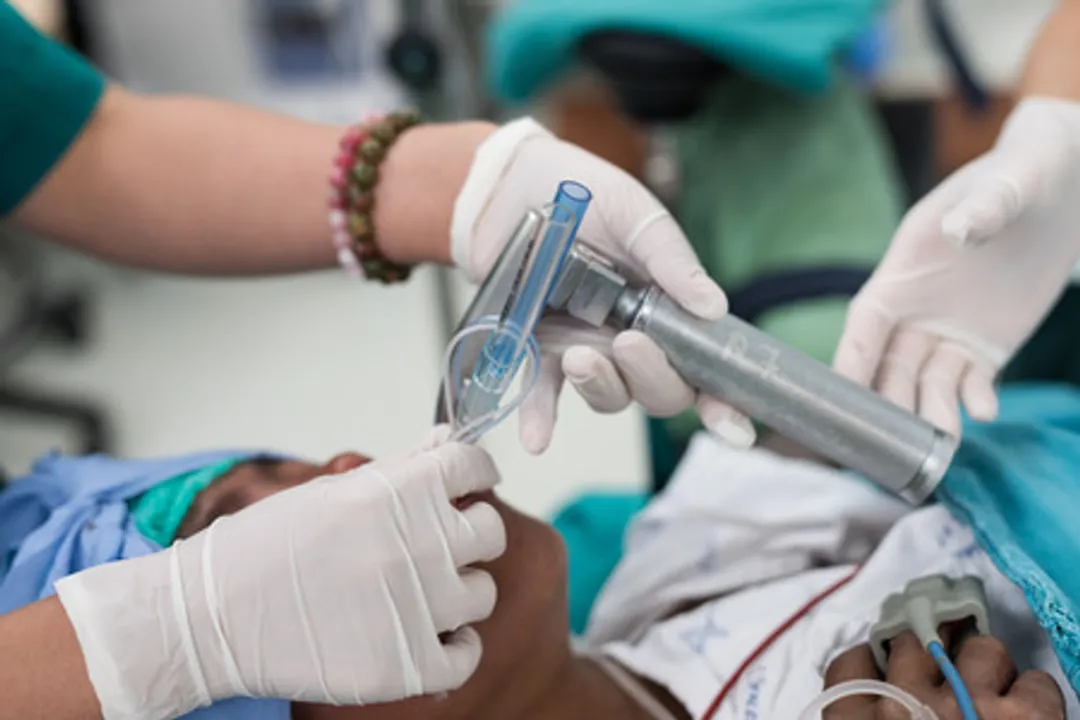Career Options in Respiratory Therapy

Chanawit Sitthisombat/123RF.com
Whether you’re a new grad or an experienced respiratory therapist, it’s nice to know what your employment options include. Although respiratory therapists often work with patients who have lung diseases, such as asthma, COPD, and cystic fibrosis, they also do much more. There are opportunities for therapists in a variety of settings in a few different capacities.
Hospital Respiratory Therapists
Most new graduates of a respiratory therapy program start their career as a hospital RT. Hospital respiratory therapists work in all patient care areas, including the NICU, emergency room, and intensive care units.
Typical responsibilities of a hospital respiratory therapist include managing patients on ventilators, administering medications, and intubating patients. Depending on the facility where you work, therapists may also draw arterial blood gasses, provide COPD education, and perform pulmonary function tests.
Opportunities for respiratory therapists are available in small hospitals, large medical centers, rehabilitation centers, and subacute facilities. According to the United States Bureau of Labor Statistic, about 4 out of 5 RT’s work in a hospital setting. Hospitals hire both rookies and experienced therapists, which is good news if you’re a new grad. Therapists who work in acute care hospitals may be required to obtain additional certifications, such as advanced cardiac life support and neonatal resuscitation.
Pulmonary Rehabilitation
Pulmonary rehabilitation programs teach patients with lung disease how to manage their condition. They also provide a guided fitness program to improve exercise tolerance and quality of life.
Respiratory therapists who work in pulmonary rehabilitation educate patients on topics such as nutrition, medication management, and decreasing infections. Therapists also lead exercise classes and teach patients how to use breathing techniques to decrease shortness of breath.
Therapists who work in pulmonary rehabilitation usually need to have at least a few years of experience in an acute care hospital. Salaries for RT’s who work in pulmonary rehabilitation programs are similar to those who work in hospitals.
Sleep Labs
Another option for respiratory therapists is working in a sleep lab doing sleep studies. Sleep studies are used to diagnose various sleep disorders such as sleep apnea, restless leg syndrome, and narcolepsy.
In some cases, respiratory therapists who work in sleep labs may be required to obtain certification as a registered polysomnographic technologist through the Board of Registered Polysomnographic Technologists.
The responsibilities of a therapist who works in a sleep lab include preparing the patient for the study, which involves attaching various monitors and equipment. Therapists also monitor the patient during the study and may review results after the study is completed.
Respiratory therapists who are interested in doing sleep studies may find employment opportunities in hospital sleep labs and independent sleep study centers. Salaries for therapists who work in sleep labs may vary based on their experience and whether they are registered polysomnographic technologists.
Equipment Sales
If you’re looking to utilize your respiratory experience differently, working in equipment sales may be an option. Respiratory therapists are hired to work for companies that sell medical equipment, including CPAP machines, ventilators, and pulse oximeters.
Therapists in equipment sales may visit different medical facilities to demonstrate how the equipment works and get the facilities to purchase the products. They may also troubleshoot equipment in facilities that are using their products and train the staff on how to properly use the equipment.
Respiratory therapists who are looking for a change of pace and do not want to provide direct patient care may enjoy working in sales. Salaries are often varied, based on whether therapists earn commission on what they sell.
Education
For therapists who enjoy teaching, there are opportunities in education. Respiratory therapists are needed to teach in respiratory therapy programs and provide patient education. For example, therapists may teach in asthma or COPD education programs. They also teach smoking cessation classes. Hospitals hire respiratory therapists to provide education to hospital staff on topics such as neonatal resuscitation and basic life support.
Respiratory therapists may also find employment opportunities in colleges and universities, healthcare facilities, nonprofit organizations, and government agencies. Salaries for respiratory therapy educators may vary, based on geographical area and experience.
Browse HospitalRecruiting.com's respiratory therapist jobs at this link: https://www.hospitalrecruiting.com/jobs/Respiratory-Therapist-Jobs/.
Related Posts
